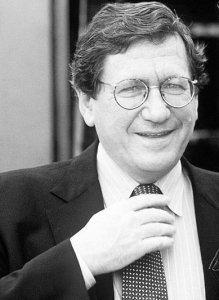When war in Bosnia reached the beginning of its end
One of the deadliest attacks of Bosnia’s savage civil war came 20 years ago yesterday, when Bosnian Serb gunners lobbed five mortar rounds near an open-air market in Sarajevo, the country’s long-besieged capital.
In the attack’s aftermath, CNN reported, “the marketplace resembled a war zone with bodies shattered and bleeding, limbs blown off, blood pooling in the street.”
The mortar attack killed more than three dozen people, most of them civilians. And it prodded NATO and the United States to action, marking the beginning of the end of the war in Bosnia, Europe’s deadliest conflict since the time of the Nazis.
After many months of dithering — and about six weeks after Bosnian Serb forces had killed thousands of Muslim men and boys in and near Srebrenica, a United Nations-designated “safe area” in eastern Bosnia — the West finally had had enough.
The market attack on August 28, 1995, was answered with “Operation Deliberate Force” — U.S.-led retaliatory air strikes under NATO’s auspices, aimed at forcing Serbs to pull back their heavy artillery from the hills around Sarajevo and to agree to talks on ending a war that claimed 100,000 lives.
NATO warplanes attacked Serb military barracks, ammunition depots, fuel dumps, air-defense sites, and communications towers in NATO’s most extensive military action since its founding after World War II. The air strikes began late on August 29, 1995, and continued until September 1, 1995; they were resumed September 5 and continued until mid-month, when the Serbs at last agreed to pull back from Sarajevo.
The Serbs were under intense pressure elsewhere in Bosnia as well: Bosnian Muslim and Croatian forces swept across territory in northern and western Bosnia that the Serbs that seized during the first days of the war, in 1992. In just a few weeks, Serb control of Bosnia slipped from 70 percent to a little more than half.
The aerial attacks and the Muslim-Croat ground offensive were vital to the Serbs’ agreeing to a ceasefire that took effect October 10. A few weeks later, on November 1, the leaders of Bosnia, Croatia, and Serbia met near Dayton, Ohio, to convene U.S.-brokered peace talks.
The negotiations, which I discuss in some detail my latest book, 1995: The Year the Future Began, seemed often to teeter on collapse. But at almost the 11th hour, the talks produced an agreement ending the war and establishing two fairly rigid statelets within Bosnia — a Muslim-Croat federation and a Serb republic. The Dayton accords reflected the realities on the ground in Bosnia in late 1995 but did little to resolve the deep and lingering suspicions based on ethnic and religious differences.
The American response to the Sarajevo market attack 20 years ago signaled the emergence of a period of muscularity in U.S. foreign policy, a willingness to apply military strength, particularly air power, in the pursuit of diplomatic objectives.
That combination was notably in evidence in 1999, when U.S.-led bombing of Serbia forced Belgrade to relinquish control of the restive province of Kosovo. It also was in evidence early in the wars in Afghanistan and Iraq.
Before muscularity became a renewed feature of U.S. foreign policy, lingering reminders of the Vietnam War had to be confronted. Before the retaliatory bombing of the Bosnian Serbs, U.S. officials wrestled with lessons of Vietnam where extensive bombing had not proven decisive.
And if aerial bombing had not been effective in Vietnam, then why would it be so in Bosnia? The conundrum was recalled by Richard C. Holbrooke in To End a War, his book about negotiating a settlement of the Bosnian conflict.
“To many of those opposing the use of airpower in Bosnia,” he wrote, “the lesson of Vietnam … was that airpower would be ineffective unless backed up by ground troops — a political impossibility in Bosnia.
“But the comparison was dangerously misleading,” Holbrooke added. “Bosnia was different [from Vietnam], and so were our objectives. While we had to learn from Vietnam, we could not be imprisoned by it.
“Bosnia was not Vietnam, the Bosnian Serbs were not the Vietcong, and Belgrade was not Hanoi. The Bosnian Serbs, poorly trained bullies and criminals, would not stand up to NATO air strikes the way the seasoned and indoctrinated Vietcong and North Vietnamese had.”
Holbrooke was the lead U.S. negotiator on Bosnia and his shuttle diplomacy in the Balkans and Western Europe in late summer 1995 helped prepare the negotiated settlement that was reached at Dayton. The outcome lent the colorful and unpredictable Holbrooke a reputation that was somewhat larger than life.
Roger Cohen of the New York Times, for example, wrote in a column eulogizing Holbrooke after Holbrooke’s death in 2010: “It was impossible to end the Bosnian war. Yet he ended it with the Dayton accords.”
More from The 1995 Blog:
- The 1995 massacre at Srebrenica and its effects on U.S. policy
- Lesson misunderstood: NATO’s 1995 bombing in Bosnia
- Predator drone down — over Bosnia, 20 years ago
- Downed pilot eludes Serbs; Americans take notice of Bosnia
- Clinton, his portrait, and the persistent shadow of scandal
- The big gap in Monica Lewinsky’s speech
- Terror in the heartland: Oklahoma City, April 1995
- Closing off Pennsylvania Ave.: 1995 and a psychology of fear
- Media fail: A 1995 subtext that’s familiar today
- Why 1995?


Pingback: The UN at 50: Palaver, pomposity, and the newspaper ‘lead’ of the year, 1995 | The 1995 Blog
Pingback: Amid suspicion and disdain, Dayton peace talks on Bosnia opened 20 years ago | The 1995 Blog
Pingback: Downer doc: Richard Holbrooke recalled on HBO | The 1995 Blog
Pingback: Bosnian war ended at Dayton 20 years ago; U.S. ‘hubris bubble’ swelled soon after | The 1995 Blog
Pingback: The mixed lessons of the Dayton accords, 21 years on | The 1995 Blog
Pingback: With us still: 1995, 25 years on | The 1995 Blog